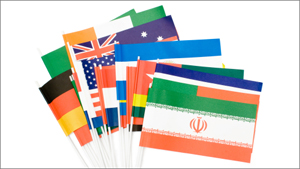The Non-U.S. Postdoc, Part 2
by
 Life as a new postdoc is tough. Life as a new postdoc in a new country can be tougher. In Part 2 of our interview with Wesley Straub, Ph.D. (Read Part 1 here) we asked the former postdoc to provide a survival guide for the first six months of the position. Here’s a breakdown of what to expect when starting a foreign postdoc.
Life as a new postdoc is tough. Life as a new postdoc in a new country can be tougher. In Part 2 of our interview with Wesley Straub, Ph.D. (Read Part 1 here) we asked the former postdoc to provide a survival guide for the first six months of the position. Here’s a breakdown of what to expect when starting a foreign postdoc.
First two weeks:
What you’ll be doing:
Writing grants.
Cleaning your assigned bench from the mess left by the previous scientist.
Reading literature concerning the new project, especially reviews.
Learning to count to 100, say hello, good-bye and thank-you, and “check please” in the new language.
Learning to make change quickly enough so that people don’t yawn while you’re at the register.
Finding one food item on restaurant menus that you like so that you can order ONLY it until you can read the rest of the menu.
Learning the public transportation system.
Getting a visa and work permit.
Registering at the US embassy.
Finding an apartment.
Tasting every beer in sight.
Wondering when you’re bed is going to arrive because sleeping on hardwood floors in a sleeping bag for two weeks has lost its charm.
What’s expected of you:
Process the employment and visa paperwork ASAP.
Quickly get up to speed on the information required to think critically of the project.
Discuss and refine the goals and approach of the proposed project as you gain information.
Together with the professor, draft 2-3 versions of a grant that incorporate new ideas.
Stress level (1-10; 10 is just before having a breakdown….): 8
What to do to get through it:
First, pay a realtor to find an apartment so that the hunt for housing doesn’t last 2 months and leave you in a studio next to the train station with termites. You’ll be able to focus on writing grants and will end up in a more comfortable apartment.
Attend a good conference.
Second, find a post-doc from the US that can guide you through the practicalities of processing the paperwork. Understandably, native Germans are not informed about the requirements for foreign workers and are not especially helpful. Stay organized. Be on top of the paperwork by double checking all of the requirements and dates. If done correctly and politely, obtaining a visa and work permit are relatively painless. If items are missing or not organized well, the process can drag out for weeks.
Weeks 3-4
What you’ll be doing:
Formulating a focused research plan.
Designing experiments that test a core hypothesis.
Ordering special reagents.
Becoming comfortable with the location of all lab items.
Preparing stock solutions of common buffers.
Starting a lab notebook.
Performing the first experiments, which will, of course, fail miserably.
Asking lots of basic questions.
…Still wondering when you’re belongings will arrive. Sleeping on hardwood floors for a month has begun to effect the way you walk and the grass in the park across the street appears to be a more inviting spot to spend the night than your barren apartment.
What’s expected of you:
A more regular schedule.
A greater confidence with the new subject material.
Early negative data.
Stress level: 5
What to do to get through it:
Read as much as possible.
Mock up a hypothetical publication that that could result from the designed experiments and review the thought and logic process with the professor.
Attend a conference as early as possible.
Months 2-3
What you’ll be doing:
Pursuing a focused research plan.
Begin contributing to maintenance of the lab.
Question the original research plan.
Embracing and worshipping a pair of Croatian movers as they deliver your personal belongings, including your bed, to your apartment.
What’s expected of you:
An firmer grasp of the research background.
Early data suggesting the trajectory of the project.
Stress level: 4
What to do to get through it:
Perform concise experiments that test the core of the hypothesis so that the project can “fail fast”.
Attend a good conference.
Establish a relationship with a research mentor other than your professor both inside and outside of the field of study.
Months 4-6
What you’ll be doing:
Realizing that the original project is doomed to fail.
Formulating an alternative research project.
Boring your colleagues with superfluous descriptions of the extreme comfort of sleeping in a bed.
Starting side projects.
Feeling like dozens of projects around you are tugging at your sleeve-a constant distraction.
What’s expected of you:
Critical evaluation of the project’s promise.
Rapid generation of an alternative research plan.
Early data suggesting an alternative research plan has promise.
Steady production of data indicating trajectory of project.
Stress level: 6
What to do to get through it:
Stay positive.
Stay focused.
Evaluate the research plan closely and maintain constant communication with the professor.
Use your outside mentors as reviewers of research goals and planned experiments.
Keep attending conferences even if no preliminary data has been obtained.
Wesley Straub obtained his Ph.D. in Pharmaceutical Chemistry from UCSF and performed his post-doctoral studies at the University of Frankfurt in Germany where he researched transcription factor structure and NMR method development. He currently works on the development, characterization and production of early stage protein therapeutics in California’s Bay Area.


Science Career Development Resources | BenchFly Blog
wrote on January 19, 2011 at 2:16 pm
[…] Non-US Postdoc, Pt 2 – a roadmap for the first six months of your postdoc- what’s expected of you and how to get through it […]